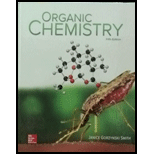
Concept explainers
(a)
Interpretation: The products formed by the treatment of
Concept introduction: The strong nucleophile, and
(b)
Interpretation: The products formed by the treatment of
Concept introduction: The strong nucleophile, and
(c)
Interpretation: The products formed by the treatment of
Concept introduction: The strong nucleophile, and
(d)
Interpretation: The products formed by the treatment of
Concept introduction: The strong nucleophile, and
Want to see the full answer?
Check out a sample textbook solution
Chapter 9 Solutions
Organic Chemistry
- Draw the product resulting from mild oxidation of (a) 2-butanol; (b) 2-methylpropanal; (c) cyclopentanol.arrow_forwardn-Butyl methyl ether is an isomer of MTBE and has a boiling point of 70 oC. Explain why the boiling point is significantly different compared to MTBE.arrow_forwardGive three reasons why ethers make good laboratory reagentsarrow_forward
- What is the correct reagent?arrow_forward1. What functional group is produced when an aldehyde reacts with H2/Pt? A.secondary alcohol B. carboxylic acid C.hemiacetal D. primary alcohol E.alkane F.tertiary alcohol G. alkene 2. What reaction occurs when an aldehyde reacts with H2/Pt to form a primary alcohol? A. Hydration B. Hydration C. Dehydration D. Oxidation E. Reduction( hydrogentation) 3. What reaction occurs when an Ester react with H+/H2O to from a carboxylic acid and alcohol? A. Dehydration B. Reduction ( Hydrogenation) C.Hydrolysis D. Hydration E.oxidationarrow_forwardDraw a structure for a lactone with 5 carbonsarrow_forward
- an acetal is a combination of what functional group a)an ester and an ether b)an ether and a hydroxyl , bonded to adjacent carbons c)two ethers d) an ether and a hydroxyl, bonded to the same carbonarrow_forwardWhat alcohol is formed when the alkene CH3CH2CH=CH2 is treated with H2O in the presence of H2SO4?arrow_forward2. a. What is the chemical structure of naphthalene, circle functional groups different than alkane,alkene, alkyne? b. Is it polar or nonpolar? _______________________ c. What is its water solubility in g/L? _________________________arrow_forward
- Chemistry: Matter and ChangeChemistryISBN:9780078746376Author:Dinah Zike, Laurel Dingrando, Nicholas Hainen, Cheryl WistromPublisher:Glencoe/McGraw-Hill School Pub Co
